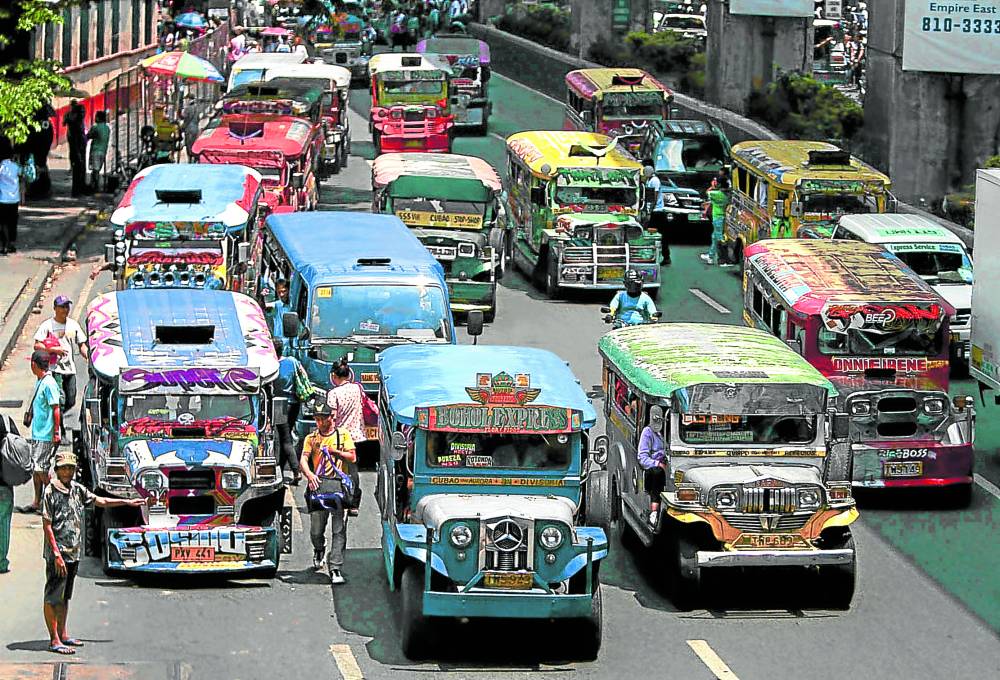Suspend PUV modernization, support local jeep makers, gov’t urged
 MANILA, Philippines — Experts from various sectors called for the indefinite suspension of the government’s Public Utility Vehicle Modernization Program (PUVMP) and pointed out the need for recalibration to ensure a fair and orderly transition to a net-zero carbon future.
MANILA, Philippines — Experts from various sectors called for the indefinite suspension of the government’s Public Utility Vehicle Modernization Program (PUVMP) and pointed out the need for recalibration to ensure a fair and orderly transition to a net-zero carbon future.
Dr. Ted C. Mendoza, a retired professor of Scientist II of the University of the Philippines (UP) Los Baños, currently serving as the Science Director at Community Legal Help and Public Interest Inc., asserted the appeal.
Joining in the plea are Dr. Rene Ofreneo, a professor emeritus and former dean at the School of Labor and Industrial Relations in UP Diliman and Dr. Antoinette R. Raquiza, a professor at the UP Diliman Asian Center and convenor at the Political Economy Program.
In a statement, the experts stressed that the agencies involved in the PUVMP’s implementation make it appear that steering away from traditional jeepneys is the main solution to de-clogging and reducing carbon pollution on the country’s main thoroughfares.
They, however, noted that in Metro Manila, jeepneys constitute only less than two percent of the total vehicles.
“Why single out the jeepneys when they constitute a minority in the vehicle population?,” the experts said.
Additionally, they questioned what they called turning a blind eye to the “carmaggedon” that is paralyzing vehicular traffic in Metro Manila.
“We join the Management Association of the Philippines in its call for the government to address this carmaggedon by prioritizing the development of mass public transport, particularly a comprehensive and well-designed rapid bus transit system,” they said.
“We also join the call of Sergio Luis-Ortiz, President of the Employers Confederation of the Philippines, for the DOTr to postpone PUVMP implementation indefinitely while the central issue of a mass public transport system is not in place,” they added.
“Ineluctable” shift to more cars
With the impending reduction of traditional jeepneys plying the streets of the Metro, Mendoza, Ofreneo, and Raquiza said that it would ineluctably “incentivize” people to buy private vehicles while waiting for the PUVMP to deliver the modern jeepneys.
“Phasing out the jeepneys without an affordable alternative for the working class commuters will also have a domino effect on domestic businesses and the economy (e.g., raise cost of living and feed inflation),” they said.
READ: SC junks plea vs PUVMP; 2 petitions still pending
Lack of plan and participation from relevant sectors
They also claimed that the PUVMP was “designed and is being implemented haphazardly due to the limited participation from the jeepney transportation sector, commuter groups, academia, and other stakeholders.”
The academes further identified the other downside of the PUVMP:
- It allegedly goes against the United Nations Social Development Goal that “no one should be left behind” in any industrial or economic modification in response to the climate emergency
- The suggested imported modern jeepneys are expensive, with a Chinese-made jeepney ranging from P2.5 to P3 million alone
- The consolidation of jeepney drivers and operators into cooperatives or corporations that is “not as a product of willing members enjoying equal rights in the association” is against the spirit of collectivism and would lead to all sorts of collective-action problems.
Golden opportunity for the local automotive industry
On the other hand, Mendoza, Ofreneo, and Raquiza said that the PUVMP could lead to the upgrade of the Philippines’ jeepney manufacturing industry and create thousands of jobs for local workers.
“The LTO-LTFRB-DOTr group, however, seems oblivious to this golden opportunity to grow our homegrown automotive industry,” they said.
“Unfortunately, our local jeepney producers cannot produce or assemble enough units at a faster rate. Initial estimates show that they can produce at most 5,000 units per year. Hence, it will take several years for Pinoy manufacturers to produce enough electric jeepneys for the country,” they added.
They are pushing that this low production problem can be solved if the government, through its financial institutions, helps build the local jeepney industry’s productive capacity.
Adopting a “more realistic” timetable for the roll-out of domestic jeepneys can also help, they said.
“We urge the government to adopt a pro-Filipino vehicle development framework that will support the local manufacture of e-jeepneys and, in the interim, allow for doable options such as retrofitting existing jeepneys with more fuel-efficient or hybrid engines. In so doing, jeepney modernization will help catalyze Philippine manufacturing as well as redound to the benefit of the riding public.”














